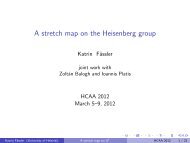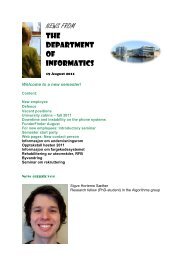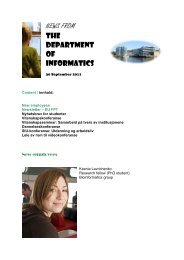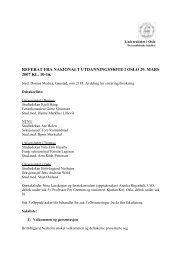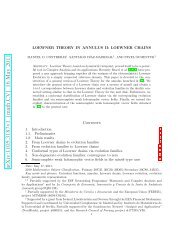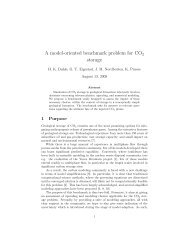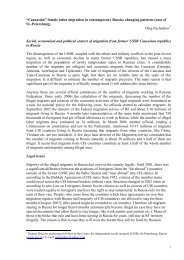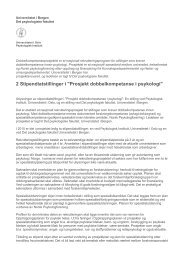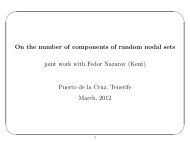Experiential metaphors in Latin - Wiley Online Library
Experiential metaphors in Latin - Wiley Online Library
Experiential metaphors in Latin - Wiley Online Library
You also want an ePaper? Increase the reach of your titles
YUMPU automatically turns print PDFs into web optimized ePapers that Google loves.
314<br />
(7) Patrue, facito <strong>in</strong> memoria habeas, tuam maiorem filiam<br />
Father.VOC do.IMP <strong>in</strong> memory have your older.ACC daughter.ACC<br />
mihi te despondisse<br />
I.DAT you.ACC promise.<strong>in</strong>.marriage.INF<br />
‘Uncle, see you remember that you have promised me your older daughter’<br />
(Plautus, Poenulus 1278)<br />
Example (8) below shows further figurative use with<strong>in</strong> the metaphorical schema <strong>in</strong> animo<br />
habere. In this case, the concrete referent aquam ‘water’ is also metaphorically thought of as<br />
an abstract entity:<br />
(8) aquam te <strong>in</strong> animo habere<br />
water you.ACC <strong>in</strong> m<strong>in</strong>d have.INF<br />
‘you have water <strong>in</strong> your m<strong>in</strong>d’ (Lucilius, Sat. Fragm. 764)<br />
To sum up, <strong>in</strong> animo habeo and <strong>in</strong> memoria habeo are frequently attested <strong>in</strong> my corpus (45 and<br />
6 tokens respectively). Conceivably, this construction may have <strong>in</strong>itially established the<br />
abstract <strong>in</strong>terpretation of the verb habeo with non-prototypical locations and ⁄ or objects,<br />
subsequently giv<strong>in</strong>g rise to other metaphorical exploitations.<br />
4. STATES ARE CONTAINERS: A FULLY PRODUCTIVE SCHEMA IN LATIN<br />
With<strong>in</strong> this metaphor, abstract mental states are <strong>in</strong>terpreted as situations placed <strong>in</strong> reality: thus,<br />
the psychological world as experienced and conceptualized by sentient humans is figuratively<br />
expressed <strong>in</strong> terms of concrete entities as they exist <strong>in</strong> the physical environment. In this case, the<br />
source doma<strong>in</strong> is a conta<strong>in</strong>er and the target doma<strong>in</strong>, metaphorically actualized <strong>in</strong> concrete<br />
places, can <strong>in</strong>volve several k<strong>in</strong>ds of psychological states. Consider some English examples:<br />
He is <strong>in</strong> love.<br />
She is <strong>in</strong> a rage.<br />
My uncle is <strong>in</strong> despair.<br />
TRANSACTIONS OF THE PHILOLOGICAL SOCIETY 109, 2011<br />
As can be noted, these <strong>metaphors</strong> are based on complex structures made up of a stative verb<br />
and a figurative prepositional phrase which has a spatial orig<strong>in</strong>.<br />
This metaphorical mapp<strong>in</strong>g is well exploited <strong>in</strong> Lat<strong>in</strong>. Several figurative schemas featur<strong>in</strong>g<br />
the conta<strong>in</strong>er image are <strong>in</strong> fact attested (I provide <strong>in</strong> brackets their token frequency <strong>in</strong> my<br />
corpus):<br />
<strong>in</strong> dubio sum ‘I am <strong>in</strong> doubt’ (3 tokens)<br />
<strong>in</strong> dubio haereo ‘I am stuck <strong>in</strong> doubt’ (1)<br />
<strong>in</strong> dubio iaceo ‘I lie <strong>in</strong> doubt’ (1)<br />
<strong>in</strong> dubio sto ‘I stand <strong>in</strong> doubt’ (1)<br />
<strong>in</strong> morbo sum ‘I am <strong>in</strong> disease’ (6)<br />
<strong>in</strong> morbo cubo ‘I lie <strong>in</strong> sickness’ (1)<br />
<strong>in</strong> timore sum ‘I am <strong>in</strong> fear’ (4)<br />
<strong>in</strong> terrore sum ‘I am <strong>in</strong> fear’ (1)<br />
<strong>in</strong> metu sum ‘I am <strong>in</strong> fear’ (11)<br />
<strong>in</strong> aegritud<strong>in</strong>e sum ‘I am <strong>in</strong> sickness’ (4)<br />
<strong>in</strong> gaudio sum ‘I am <strong>in</strong> joy’ (1)





